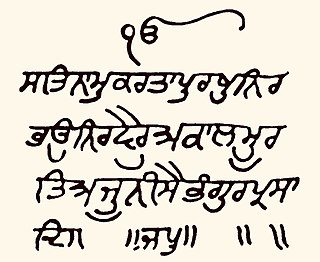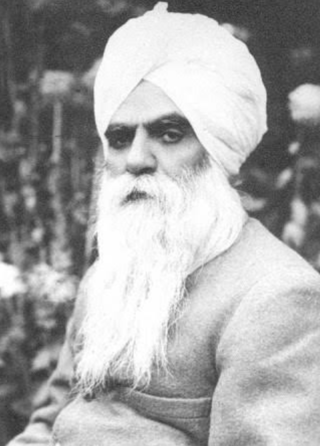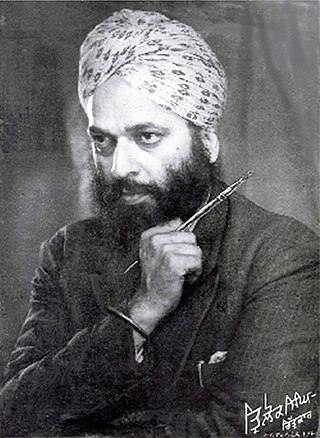Related Research Articles
The following outline is provides an overview of Sikhism, or Sikhi.

The Mūl Mantar is the opening verse of the Sikh scripture, the Guru Granth Sahib. It consists of twelve words in the Punjabi language, written in Gurmukhi script, and are the most widely known among the Sikhs. They summarize the essential teaching of Guru Nanak, thus constituting a succinct doctrinal statement of Sikhism.

Sobha Singh Naqqashi was an artist from Punjab, India.

Bhai Vir Singh was an Indian poet, scholar and theologist of the Sikh revival movement, playing an important part in the renewal of Punjabi literary tradition. Singh's contributions were so important and influential that he became canonized as Bhai, an honorific often given to those who could be considered a saint of the Sikh faith.

Guru Har Sahai is a city and a municipal council in Ferozepur district in the Indian state of Punjab. Nearby cities are Ferozepur, Sri Muktsar Sahib, Fazilka, Bathinda.
Jat Sikh or Jatt Sikh is an ethnoreligious group, a subgroup of the Jat people whose traditional religion is Sikhism, originating from the Indian subcontinent. They are one of the dominant communities in the Punjab, India owing to their large land holdings. They form an estimated 20–25% of the population of the Indian state of Punjab. They form at least half of the Sikh population in Punjab, with some sources estimating them to be about 60–66% appx. two-third of the Sikh population.

Giani Gurdit Singh was born in Mithewal village in the state of Punjab, India. He was considered one of the greatest contemporary writers in Punjabi, and his book Mera Pind is regarded as a classic. It is now in its 14th edition and has been in print continuously since 1961. He was also a pioneering journalist, the Owner-Editor of Parkash from 1947–1978. He was also the editor of Singh Sabha Patrika, a monthly magazine of Sikh history and divinity. Giani Gurdit Singh graduated as "Giani" from Punjab University, Lahore in 1945, and he specialised in literature, divinity, history and folklore. He was a member of the Punjab Legislative Council from 1956 to 1962. He contributed to the debates at that time and in the creation of Punjabi University, Patiala and the recognition of Takht Sri Damdama Sahib, Talwandi Sabo, as the 5th Takht of the Sikhs. He was General Secretary of the Singh Sabha Shatabadi Committee, Amritsar, renamed Kendriya Sri Guru Singh Sabha. As the editor of the magazine Singh Sabha Patrika, he focused on issues of importance to the Sikhs. He also established two Guru Granth Vidya Kendras, one in Chandigarh and another in Mehrauli, Delhi.
Dr. D. P. Singh, born 1956, is an Indo-Canadian scientist, educationist, author science fiction writer, Sikh theologian, and TV host. As a widely travelled person, mostly for his academic research, and promotion of science in developing countries, he has published about 100 research papers in Acoustics, Polymer Physics, Condensed Matter Physics and Material Science. Besides, he has published over 1000 general articles on the topics related to Science, Environment and Religion.

The Bhatra Sikhs are a group within the Sikhs who originated from the bards of the time of Guru Nanak.

Dalip Kaur Tiwana was one of the foremost novelists and short-story writers of contemporary Punjabi literature. She won awards, both regional and national, and was a widely translated author. She retired as Professor of Punjabi, and Dean, from Punjabi University, Patiala. She is widely credited as a tour-de-force in the creation of the contemporary literature in the Punjabi language.

The Panjab Digital Library is a voluntary organization digitizing and preserving the cultural heritage of Panjab since 2003. With over 65 million digitized pages, it is the biggest resource of digital material on Panjab. There are many historically significant documents stored and made available online. Its scope covers Sikh and Punjabi culture. The library funded by The Nanakshahi Trust was launched online in August 2009. Its base office is located at Chandigarh, India.
Santokh Singh Dhir was an Indian writer and poet who wrote in Punjabi. He was known for his stories Koee Ik Sawaar, Sanjhi Kandh and Saver Hon Tak. He was awarded the Sahitya Akademi Award for his story collection Pakhi (1991) in 1996 by the Government of India. He died on 8 February 2010.

Harbans Singh was an educationist, administrator, scholar and the editor-in-chief of the Encyclopaedia of Sikhism. He was respected for his contributions to Sikh scholarship and Punjabi literary studies and had a vital and pervasive influence in the field of religious studies, with special reference to Sikhism.

The Jathedar of the Akal Takht is the head of the Akal Takht and head of the Sikhs worldwide. The jathedar has the de facto power as the supreme spokesperson of the Khalsa to summon, trial and sentence any person who identifies as a Sikh from the Akal Takht.

Trilok Singh Chitarkar (1914-1990) was a versatile Indian painter. He has unique style of presenting himself through variety of themes - Sikh religion, history, culture, folk lore, love legends, portraits, social evils, nature, illustration of Gurbani, Shabads, visuals in Punjabi Encyclopedia and books. He was well versed with deep knowledge of Gurbani, history and religion. He knew many languages i.e. Gurmukhi, Punjabi, Hindi, English, Urdu, Persian, Assamese and Bengali. He translated articles from Bengali to Punjabi and published these in the book titled Bangla De Daab in 1974. The Artist was honoured in 1973 by the Chief Minister, Punjab,India Giani Zail Singh at a state level function organised at his residence, Chitralok, Patiala. Language department, Punjab published a book in Punjabi-Chitralok's Contribution to Art and released on the 70th birthday of the artist, 10 December 1984 at a special function organised in Central Library at Patiala for his contribution to Art.

Bhai Baldeep Singh is a Ragi known for his Shabad Kirtan. He is a researcher and revivalist for conventional string instruments like Dhrupadi Rabab, Saranda, Tambura (Tanpura), Dilruba used for Sikh music since Guru's Times. He is an accomplished Pakhawaj Mridang Jori player. He is the founder and chairman of Anad Foundation organisation dedicated to Sikh music. He was an unsuccessful candidate of Aam Aadmi Party in 2014 general elections for Punjab state of India.
Inderjit Kaur Sandhu, widely known as Inderjit Kaur, was an Indian educationist and administrator. She was the third Vice-Chancellor of Punjabi University, Patiala, and Chairperson of the Staff Selection Commission, New Delhi. Sandhu was the first woman to head both these organisations. After retirement, she lived in Chandigarh, India.
References
- ↑ Life!, The Straits Times on 8 July 2008
- ↑ Book details from the biographical information in Arjan Singh, DFC: Marshal of The Indian Air Force by Roopinder Singh
- ↑ The Tribune Website
- ↑ List of Roopinder Singh's articles in The Tribune
- ↑ List of Punjabi University Vice-Chancellors Archived 27 November 2010 at the Wayback Machine
- ↑ "Giani Gurdit Singh dead". The Tribune. India. 17 January 2017. Retrieved 22 March 2018.
- 1 2 Roopinder Singh Blog
- ↑ The Tribune Book Review
- ↑ The Tribune Book Review
- ↑ WorldSikhNews.com Press Release
- ↑ https://www.dk.com/us/book/9780744077520-sikhs/